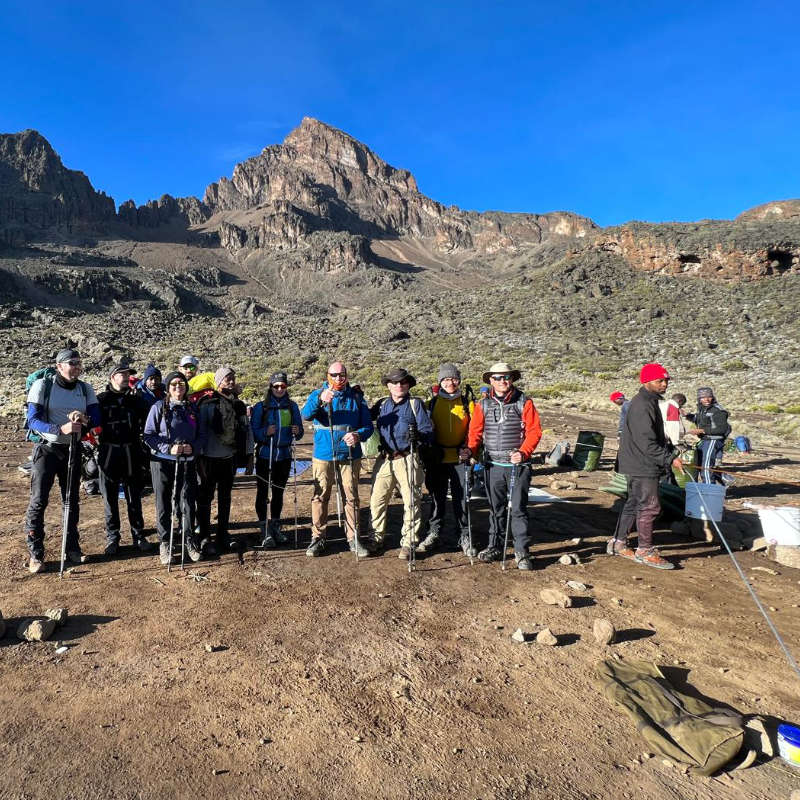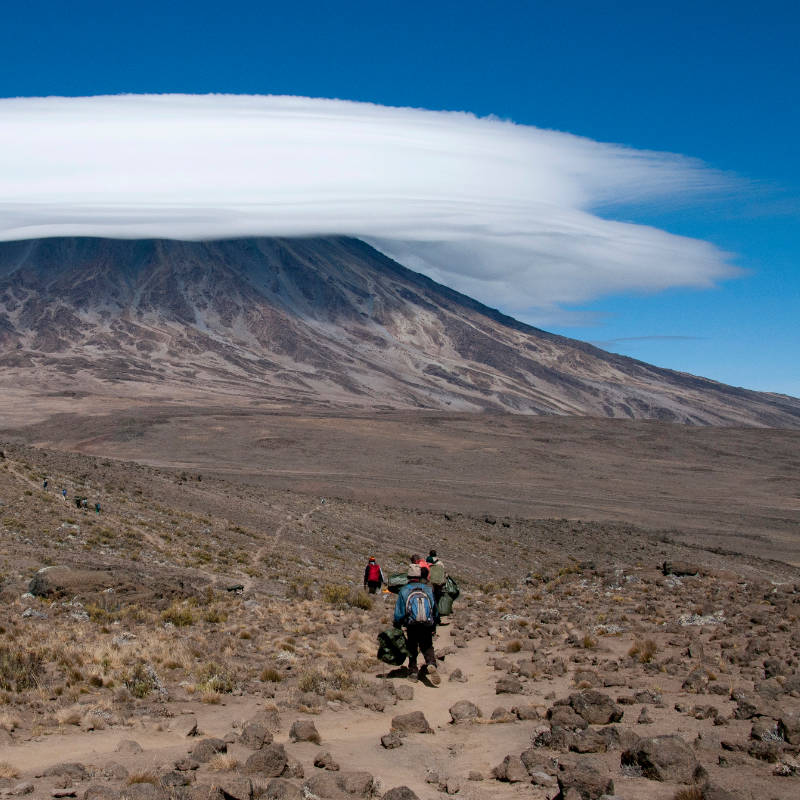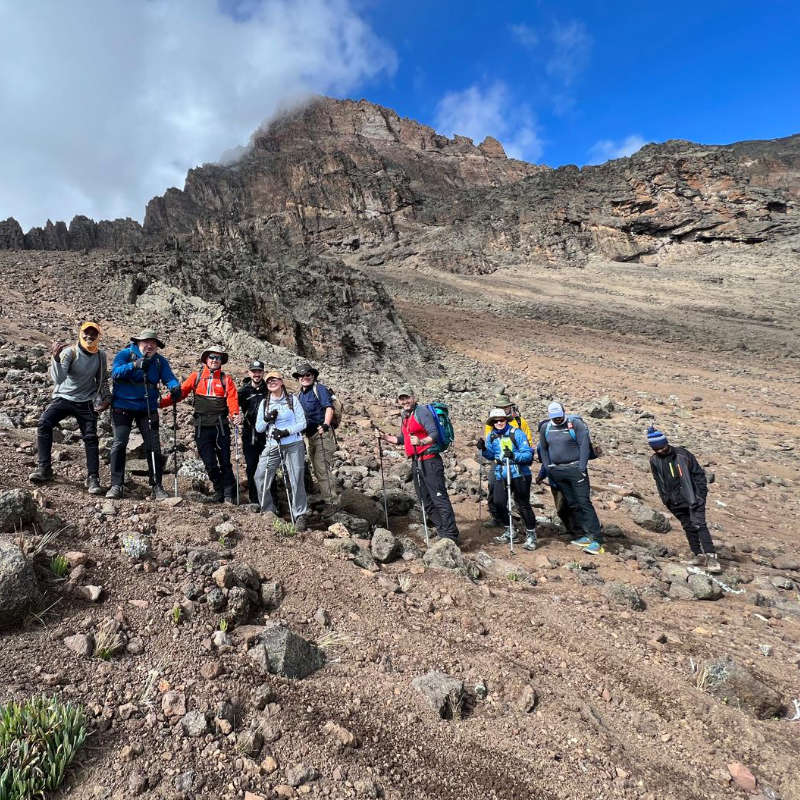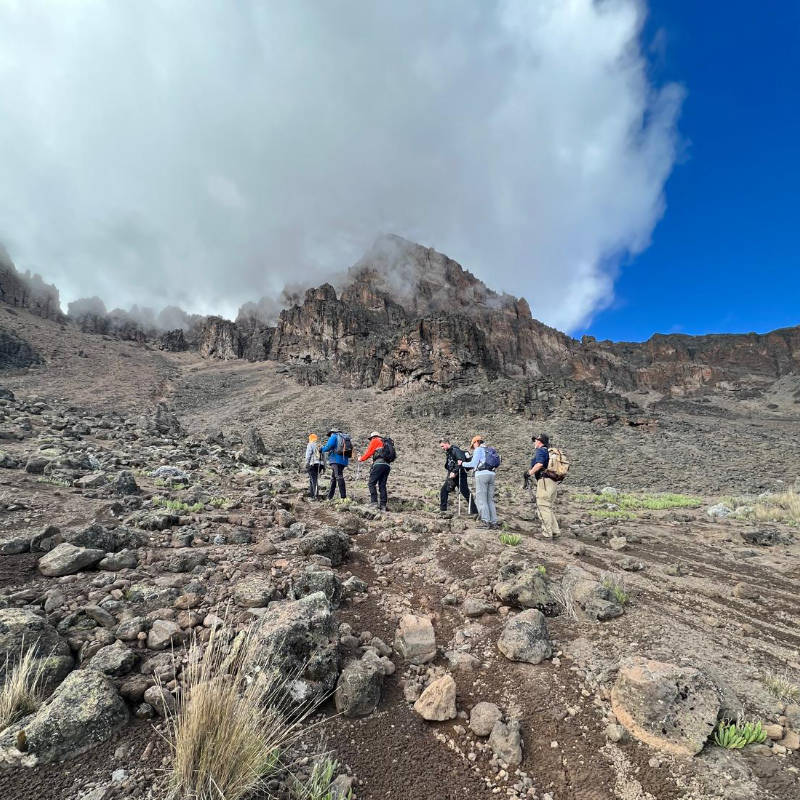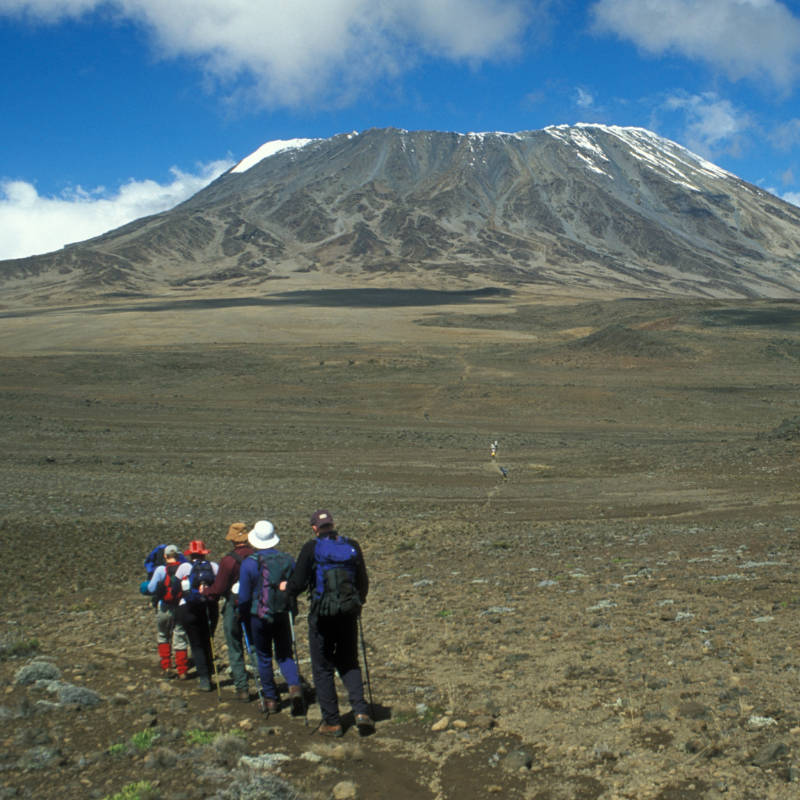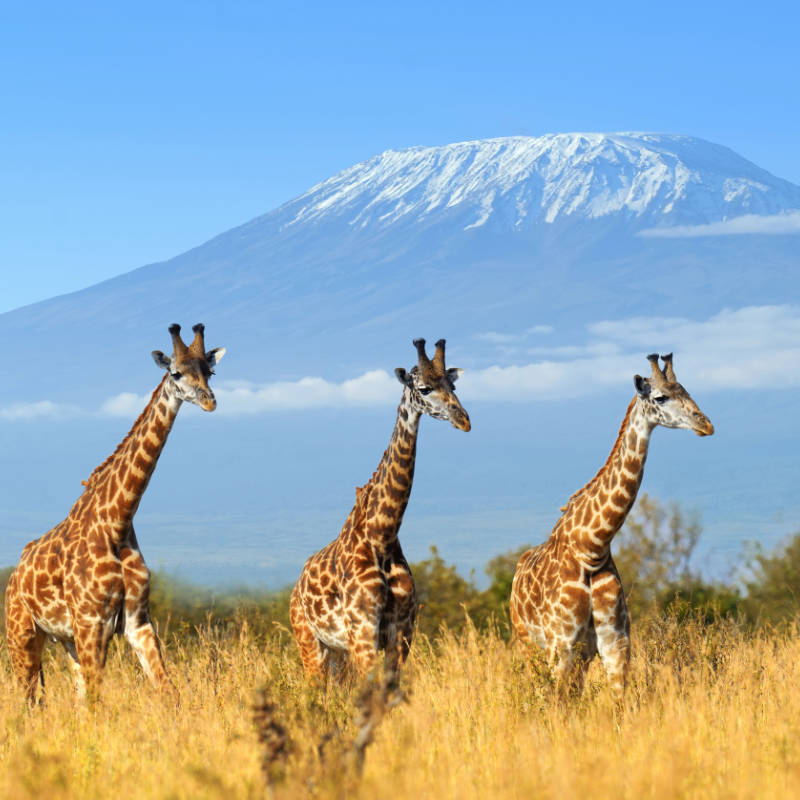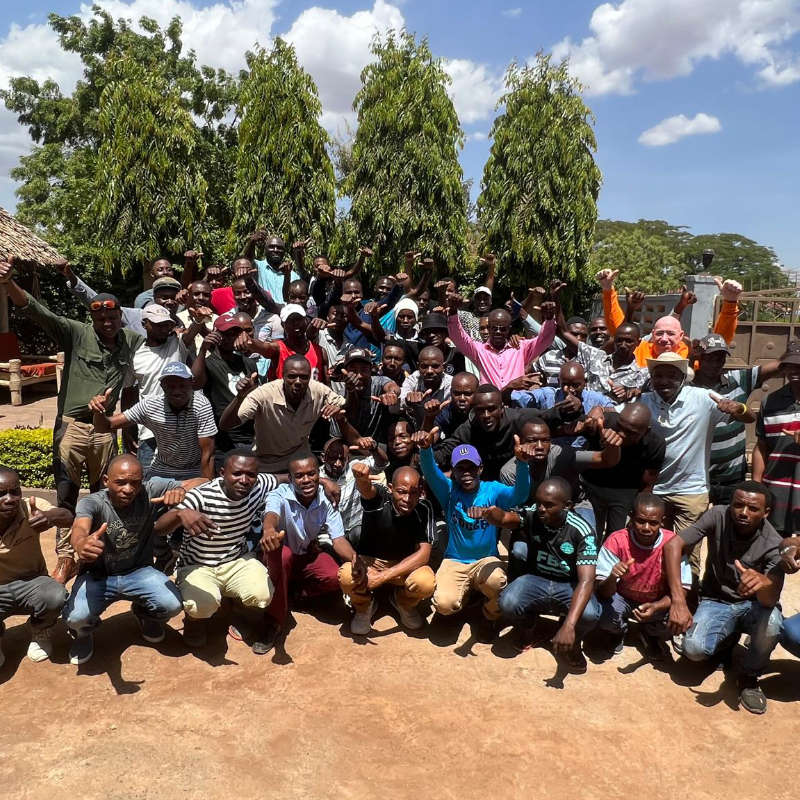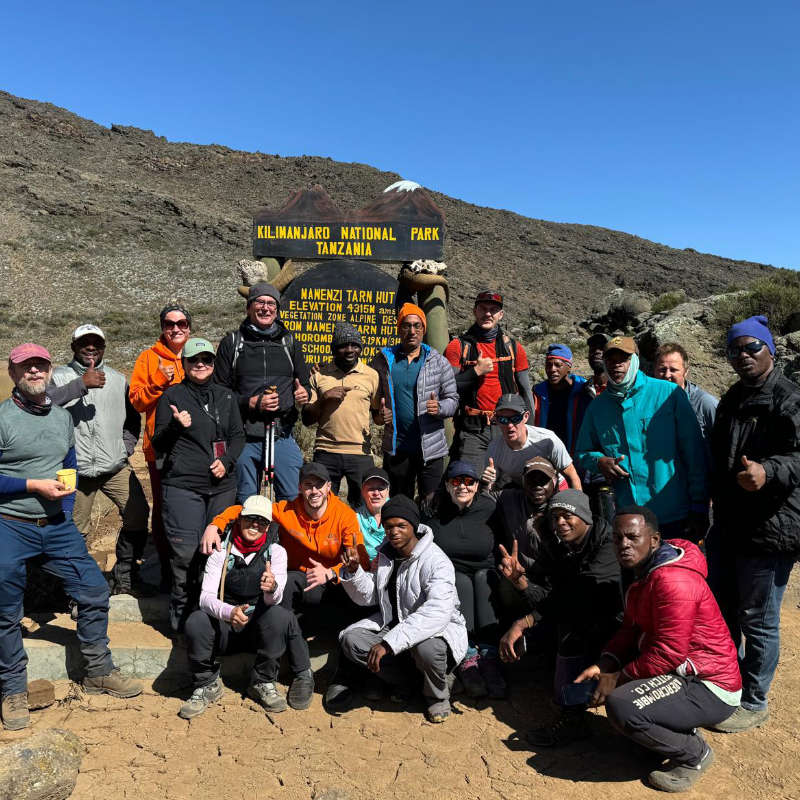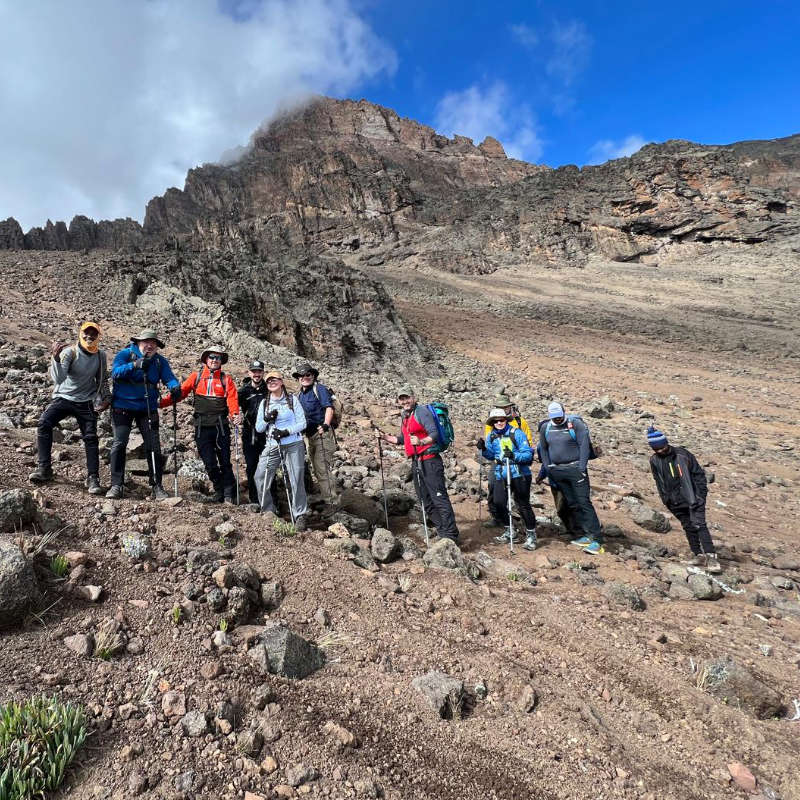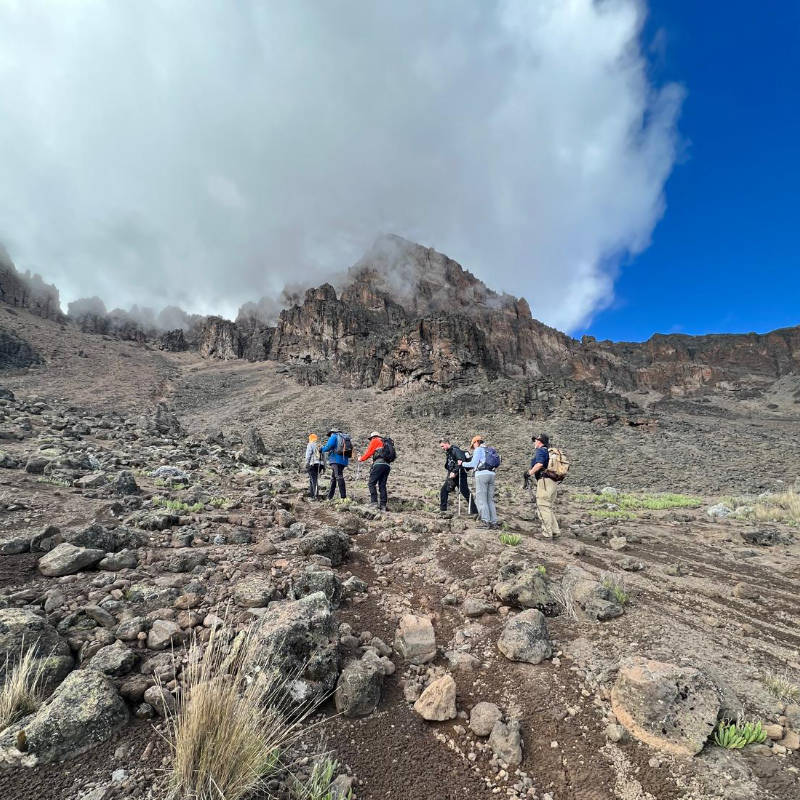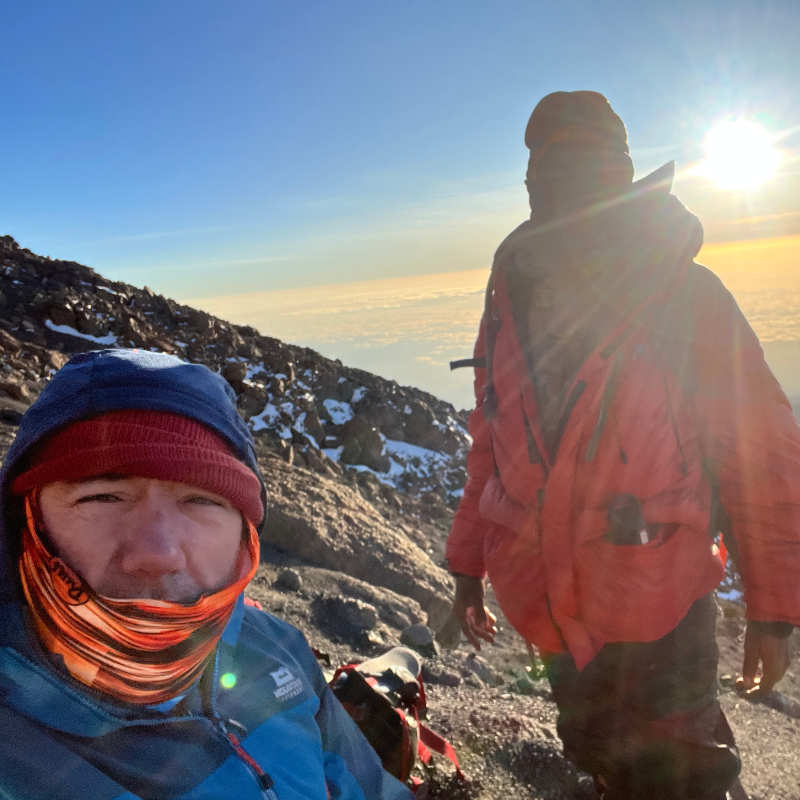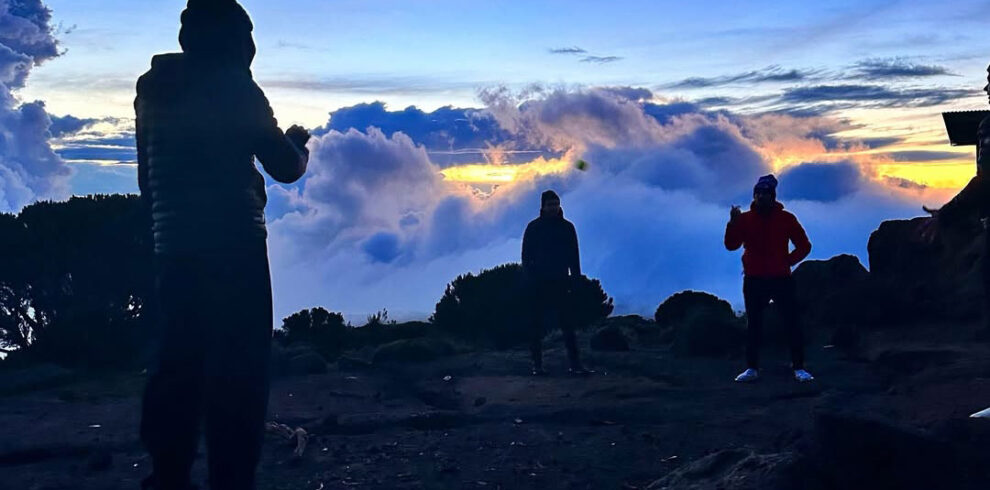Kilimanjaro Hiking Rongai Route (Extended)
Guaranteed Availability:
1st June - 31st March 2025/26
1st June - 31st March 2026/27
1st June - 31st March 2027/28
Duration: 7 Days
Adult Price: £2822.00
Child Price: £2185.00
Deposit: £250.00
View DetailsThe Pathway Events / Kilimanjaro Trips / Kilimanjaro Hiking Rongai Route (Extended)
Trip Details
The Rongai route is the only route that approaches Kilimanjaro from the north, close to the Kenyan border. Though gaining popularity amongst climbers, Rongai has low traffic. It is the preferred route for those looking for an alternative to the crowded Marangu route, for those who would like a more remote hike, and for those who are climbing during the rainy season (the north side receives less precipitation).
The minimum number of days required for this route is six days, and seven days are recommended. Although the scenery is not as varied as the western routes, Rongai makes up for this by passing through true wilderness areas for days before joining the Marangu route at Kibo camp. This route descends down the Marangu route.
Rongai is a moderately difficult route and is highly recommended, especially for those with less backpacking experience.
Highlights
- The only route approaching Kilimanjaro from the north, offering a peaceful and less crowded trek.
- Ideal for climbing during the rainy season, as the northern side receives less precipitation.
- Trek through untouched, wild landscapes before joining the Marangu route at Kibo Camp.
- A great choice for climbers with less experience, offering a challenging yet achievable climb.
- Typically completed in six days, with seven days recommended for better acclimatization.
- Pass through diverse ecosystems, from lush rainforests to alpine deserts.
- End your journey by joining the Marangu route and descending down for a complete Kilimanjaro experience.
Click here to contact us if you questions
Itinerary
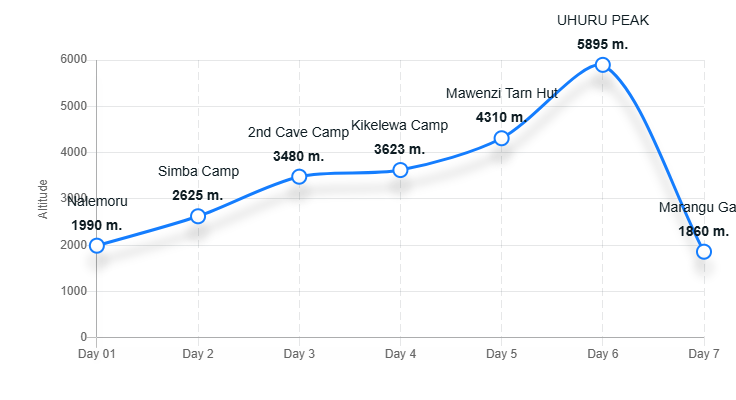
Day 01: Arrival in Tanzania – Kilimanjaro International Airport
Upon your arrival at Kilimanjaro International Airport, our representative will be waiting to welcome you. You will then be transferred to Maridadi Hotel, where you can relax and recover from your flight.
If you are already in Tanzania, we can also arrange pickup around Moshi/Arusha and transfer you to Maridadi Hotel, where the tour will begin.
In the evening, you will meet your mountain guide for a detailed briefing. He will go over the itinerary, provide important tips, and advise you on what to wear and pack to ensure a safe and comfortable climb.
- Accommodation: Mountain Camping Tent Stay
- Meals: Breakfast + Lunch + Dinner
Day 02: Hotel – Nalemoru Gate (1990m) to Simba Camp (2625m)
This morning we will drive from Hotel Arusha/Moshi to the village of Nale Moru for the starting point of the Rongai route. The first stage of the trek is through farmland and pine forests. You may have a chance to see the beautiful Colobus monkeys or if you’re lucky enough, elephants or buffalos en route. Our first camp will be the Simba Camp located at the edge of the moorland zone at 2625m.
Distance covered: 8km / 5mi
Approx. time taken: 4 – 5 hours
- Accommodation: Mountain Camping Tent Stay
- Meals: Breakfast + Lunch + Dinner
Day 03: Simba Camp (2625m) to 2nd Cave Camp (3480m)
Today’s trek begins with a steady ascent up to the ‘Second Cave’ (3450m) with superb views of Kibo and the Eastern ice fields on the crater rim. Our path is lined by a variety of flowers including Carduus keniensis and bright red gladiolus. After stopping for lunch, we leave the main trail and set out across the moorland on a smaller path towards the jagged peaks of Mawenzi. As we trek we sight Lobelia deckenii, unique to the Kilimanjaro moorland zone. Our campsite is in a sheltered valley encircled (collocated) with giant senecios (Dendrosenecio kilimanjari) near Kikelewa Caves.
Distance covered: 5km / 3.1mi
Approx. time taken: 3 – 4 hours
- Meals: Breakfast + Lunch + Dinner
Day 04: 2nd Cave Camp (3480m) to Kikelewa Camp (3630m)
Leaving the pine forest behind us, carry on with a steady ascent walking through the moorland. There are superb views of the Eastern ice fields on the crater rim of Kibo, the highest of the three volcanoes that form the mountain. We will leave the main trail and strike out across moorland on a smaller path towards the jagged peaks of Mawenzi, the second of Kilimanjaro’s volcanoes. We will set up camp today in the sheltered valley near Kikelewa caves at 3630m.
Distance covered: 5km / 3.1mi
Approx. time taken: 3 – 4 hrs
- Accommodation: Mountain Camping Tent Stay
- Meals: Breakfast + Lunch + Dinner
Day 05: Kikelewa Camp (3630m) to Mawenzi Tarn Hut (4310m)
This morning we have a short but steep ascent up grassy slopes which is rewarded by a superb view of the Kenyan plains to the north. We leave vegetation behind shortly before reaching our next camp at Mawenzi Tarn Hut directly below the towering cliffs of Mawenzi. This afternoon you have a chance to rest or explore the surrounding area to aid acclimatization.
Distance covered: 8km / 5mi
Approx. time taken: 4 – 5 hours
- Accommodation: Mountain Camping Tent Stay
- Meals: Breakfast + Lunch + Dinner
Day 06: Mawenzi Tarn Hut (4310m) to Kibo Hut (4700m)
We leave our campsite and cross the lunar desert of the ‘saddle’ between Mawenzi and Kibo. After a couple of hours of trekking, reach this spectacular place, with the summit of Kilimanjaro in the background and our trail to the high camp stretched out before our eyes. Upon reaching our camp the remainder of the day will be spent resting in preparation of the final ascent after a very early night!
Distance covered: 8km / 5mi
Approx. time taken: 5 – 6 hours
- Accommodation: Mountain Camping Tent Stay
- Meals: Breakfast + Lunch + Dinner
Day 07: Kibo Hut (4700m) to UHURU PEAK (5895m) & down to Horombo Hut (3700m)
Today is “The Big Day” – the summit stage. You will begin your final ascent around midnight which will be long and strenuous. Passing the Hans Meyer Cave at 5220m, the climb slowly but surely goes upwards. At sunrise, you will reach Gillman’s Point (5681m) – the crater rim of Kilimanjaro – where the sun will slowly start to warm up the land. After a further hike of 1 – 2 hours, you will reach Uhuru Peak at 5895m. On your return to Kibo Hut, a warm meal awaits you followed by a 1 – 2 hour break before proceeding back down to Horombo Hut.
Distance covered: 22km / 13.7mi
Approx. time taken: 12 – 15 hours
- Accommodation: Hotel
- Meals: Breakfast + Lunch + Dinner
Day 08: Horombo Hut (3700m) to Marangu Gate (1860m)
The last stage passes through the heath and moor zone to the Mandara Hut (2700m) where a warm lunch is waiting for you. Soon, you will once again pass the tropical rainforest and after a total time of 6 hours trekking, you will be back at the Kilimanjaro National Park Gate (1860m). After saying goodbye to your mountain guides, a short transfer follows to take you back to your hotel in Moshi. Once there, you can take a warm and relaxing shower and celebrate your success in reaching the summit of the Kilimanjaro.
Distance covered: 20.8km / 12.9mi
Approx. time taken: 8 hours
Day 09:
Today marks the end of your unforgettable adventure. Enjoy your final moments in Tanzania before our driver transfers you to Kilimanjaro International Airport for your journey home.
If you wish to extend your holiday, we can arrange an exciting safari in Tanzania’s national parks or a relaxing beach getaway in Zanzibar to complement your Kilimanjaro experience.
Click here to contact us if you questions
Frequently Asked Questions
None, but previous hiking or climbing experience will help. You need to be fit and healthy and have a good pair of worn-in hiking boots. The fitter you are the more you are likely to enjoy it.
There are at least six routes to the top, Uhuru peak. You will hike between 53 and 73km depending on which route you choose. The shortest and toughest is the 5-day Umbwe route. Allowing extra days will help you to acclimatize better and improve your chances of reaching the summit. The easiest and most popular route is Marangu (which can be done in five), but we use six days for this route.
Mount Kilimanjaro is the highest freestanding mountain in the world and the highest mountain in Africa. Its highest point is Uhuru Peak on the Kibo crater at 5895m above sea level.
Mount Kilimanjaro can be climbed anytime throughout the year. Most travelers prefer climbing during the dry seasons: December to March, June to October. Many consider the best months to climb Kilimanjaro to be January, February, and September.
On most routes, you’ll trek 4-7 hours most days. On certain routes you’ll trek as many as 10-15 hours on the longest days.
Prior to the climb, you’ll enjoy an acclimatization day with wildlife viewing and nature walks. Trekking through the rain forest, you’re likely to spot black-and-white Colobus monkeys, tropical birds and more.
Highly-trained chefs prepare three hot nutritious meals daily, as well as trail snacks and afternoon tea each day. You’ll eat all your meals in a solar-lit dining tent with your fellow trekkers and head guide. Delicious vegetarian, vegan, gluten-free and other specialty meals can be provided (with advance request). We’re happy to send you a sample menu—just ask!
Vegetarian, vegan, gluten-free, celiac, lactose-free, or if you have any allergies, just give us a heads up and you will be catered to
Your mountain camps are set up and broken down each day by expert camp porters. You’ll stay in double occupancy all-weather tents with full-ground pads to keep you and your gear dry. Private toilet tents, solar-lit dining tents with tables and chairs, and basins of hot water for washing are provided in every camp. Grand Traverse treks include upgraded solar-lit walk-in-height sleeping tents with mountaineering beds and mattresses for additional comfort.Your mountain camps are set up and broken down each day by expert camp porters. You’ll stay in double occupancy all-weather tents with full-ground pads to keep you and your gear dry. Private toilet tents, solar-lit dining tents with tables and chairs, and basins of hot water for washing are provided in every camp. Grand Traverse treks include upgraded solar-lit walk-in-height sleeping tents with mountaineering beds and mattresses for additional comfort.
In the individual trip pages there is a detailed section on what is included and excluded.
Yes, it is expected and much appreciated. The amount depends on the number of days, but can range from $150 and $300 per hiker. Tips are pooled and shared amongst the crew. Bring US dollar bills.
Mount Kilimanjaro can be climbed anytime throughout the year. Most travellers prefer climbing during the dry seasons: December to March, June to October. Many consider the best months to climb Kilimanjaro to be January, February, and September.
Click here to contact us if you questions
The Pathway Support Package
The Pathway Support Package is what makes the difference. This isn’t just a booking – it’s a complete preparation experience designed to remove uncertainty and set you up for success. From the moment you commit, we guide you through every step.
You’ll receive detailed training plans, packing lists, travel tips and practical guidance to make sure nothing is left to chance. On top of that, you’ll get three tailored coaching sessions with endurance specialist Doug White and one mindset session with Stevie Kidd.
Our team becomes your team - committed to helping you reach the summit and enjoy every moment of the journey along the way.
✅ Trip Essentials
- How To Apply For a Visa
- Travel Insurance Information
- Transfer Information
- Accommodation Details
- Health & Hygiene
✅ Equipment Lists
- Gear List
- Clothing
- Sleeping & Other Equipment
- Toiletries & Medicine
- Technical Equipment
✅ Coaching
- Not sure where to start, don't worry we will provide you with everything you need
- Detailed training plans
- Checklists
- Coaching Calls
Click here to contact us if you questions
Gallery
Click here to contact us if you questions
Useful Info
Tips for a Successful Climb
BE PROPERLY EQUIPPED
An essential part of your preparation will be to ensure that you are well equipped for your summit attempt. Print our final Packing List and mark it off, to ensure that you are. Click on Packing List to get to this very important step in your preparation.
BE PHYSICALLY PREPARED
It is important that your body is adequately prepared for the physical challenges of Mount Kilimanjaro. Develop your fitness and get your body in shape for your Kilimanjaro summit expedition.
MENTAL PREPARATION
It is possible to summit Kilimanjaro successfully. Many before you have succeeded. This should be topmost in your mind when preparing for the summit attempt. You should always remain in a positive state of mind, but not overly arrogant. Try to anticipate various different scenarios, which you may possibly encounter on the mountain and try to work out the most suitable course of action, mentally by yourself or even as a group. Your mental stamina will, without a doubt, make the really difficult sections, like from Kibo to Uhuru or from Barafu to Uhuru, easier to complete. Remember if you are properly equipped, you have taken everything as indicated on the Packing List, you are physically prepared and have all the knowledge gained from guide – you will be mentally confident for the physical part of Kilimanjaro.
ADEQUATE TRAVEL INSURANCE
Make sure that you have adequate travel and medical insurance, which will also provide you with cover for the climb up Kilimanjaro.
ON THE MOUNTAIN
GO SLOWLY
Go slowly – “Pole Pole” as they say in Swahili! This is also very important during your first days of climbing. Even if you feel well, slow down and enjoy the scenery. The biggest cause of altitude sickness is ascending too high too fast! The slower you hike to more time you give your body to acclimatise.
DRINK ENOUGH WATER
Make sure that you drink at least 3 – 4 litres of liquid a day – preferably water. For your first day it is recommended that you take along fresh water, which may be purchased at the hotel in Moshi before your climb. Try to get the bottles with the screw tops, this way you will also have containers in which to take water further up the mountain. Running water on the mountain is safe to drink from day-2 onwards, but care should still be taken. If you are not used to fresh water in nature, prevent any inconvenience by using water purification tablets.
REMEMBER! A functioning “body water balance” is one of the keys to a successful climb!
WALK HIGH – SLEEP LOW
If possible and especially on your acclimatization day “walk high – sleep low” Try to do a short evening stroll to a higher altitude and then descend to sleep at the camp at a lower altitude. This is essential on your acclimatization day.
TAKE A WALKING POLE
A walking pole is essential. Use of ski poles reduces external and internal loads on the knee joint by up to 20%. Using 1 ski pole is a must, but 2 poles are recommended.
Click here to contact us if you questions
Travel Info
For Entry into Tanzania
Passport
Your passport must have at least six months of validity from the date of entry. Additionally, Tanzania requires that there should be a minimum of one blank page in your passport for a visa stamp upon arrival.
Visa
Most travellers visiting Tanzania require a visa for entry. You can determine your eligibility and apply for an e-visa by visiting the official website. The standard cost for a visa is $50 USD and processing time is around 2 weeks.
Travel insurance
Insurance is not a requirement to enter Tanzania, but in my opinion, travel insurance is a must – especially when going on safari. It provides peace of mind, covering unforeseen circumstances such as health emergencies, accidents, and loss of belongings.
Yellow Fever Vaccine*
Travelers aged 1 year and older arriving from countries at risk for yellow fever virus transmission must provide proof of yellow fever vaccination. This requirement also applies to layovers exceeding 12 hours in countries with a risk of yellow fever virus transmission. If you’re considering a layover in Addis Ababa or another place with yellow fever risk, keep this in mind.
Travel tip
Store your important paperwork securely in a waterproof and sealable bag to protect them from humidity and unexpected downpours. It’s also a good idea to make scanned copies of essential documents and store them in a separate location from the originals. This ensures a backup in case of loss or theft.
Click here to contact us if you questions
Terms & Conditions
What You Need to Know
Your Deposit is Non-Refundable
As soon as you book, we begin preparing your journey – reserving your space, tailoring your support package, and getting vital logistics in motion. For that reason, deposits are non-refundable.
Full Payment is Due 90 Days Before Departure
To finalise your trip, full payment is required at least 90 days before your departure date. If you book within 90 days of departure, full payment will be due immediately.
Trip Forms Are Required Before We Can Proceed
Once your deposit is received, we’ll send you essential trip information, including forms for each participant. These must be completed before we can release further details about your trip – they’re crucial for us to tailor your experience properly and keep everything running smoothly.
Your Hosts in Tanzania
Your Kilimanjaro expedition will be hosted by our trusted partners, Migration Venture Africa. They are responsible for your on-the-ground experience from arrival in Tanzania through to your summit and return. We’ve built a long-standing, highly collaborative relationship with them to ensure everything meets the high standards we promise.
Flights Are Not Included
Please note that your package does not include international flights to or from Tanzania. However, we’re happy to advise on travel options if needed.
Coaching & Support Calls
You will receive video coaching sessions with Doug White (our endurance specialist) and Stevie Kidd as part of your package. These are delivered via video call. If you’d like to arrange additional coaching before or after your trip, we’re happy to organise that – just let us know (fees apply).
Need to Speak to Us?
We’re here to help. You can reach us any time on:
📞 +44 (0) 330 311 2413
📧 inspire@steviekidd.co.uk
Click here to contact us if you questions
What People Said
“Absolutely life-changing, and very difficult to summarise the whole experience”
Lisa Newman
“The Pathway helped me to open my heart and connect. The experience has put things into perspective. He adds tremendous value by pushing us out of our comfort zone and encouraging us on a path of self-discovery.”
Ian Killeen
“The most amazing and emotional experience so far! I definitely recommend The Pathway.”
Anete Eglija
“It’s an opportunity to change when needed, improve when needed, put things in your life in perspective when needed.”
Carlos Bertrand
“I feel honoured to have been part of the Reach Your Peak Kilimanjaro trip. I experienced unbelievable personal growth, unexpected friendships and enlightenment to what I am actually capable of doing.”
Paula Pierceall

It's Time
Take the first step
Every great adventure starts with a single decision. Book your Kilimanjaro journey today
Start Your JourneyTime to Commit
Make It Real
Stop dreaming, start climbing. Booking now is the first move towards your summit.
Book My Climb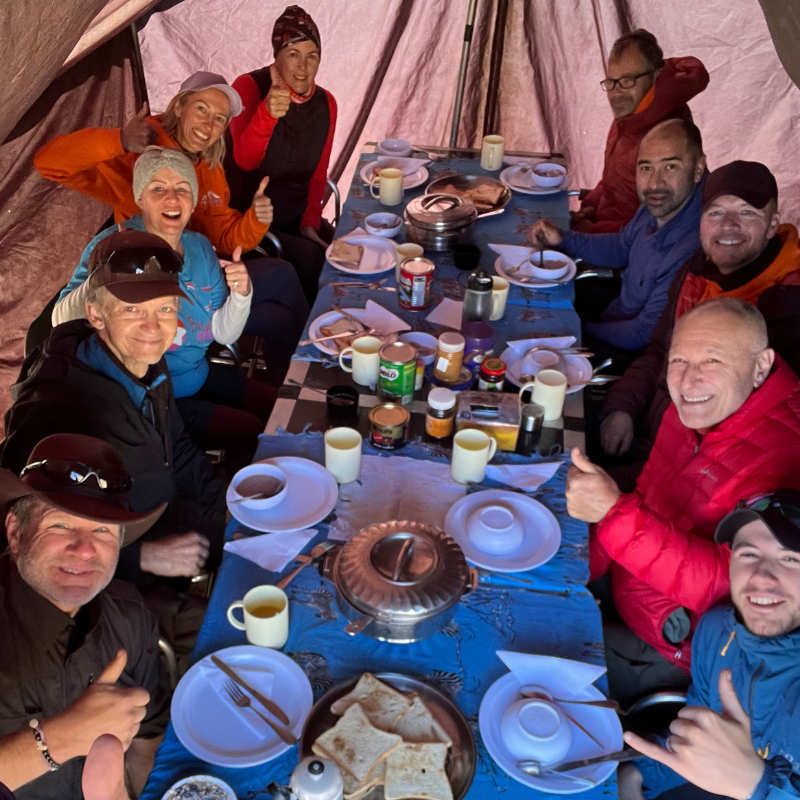
Begin Your Summit Story
This is your moment – claim it. Secure your place and start preparing with confidence.
